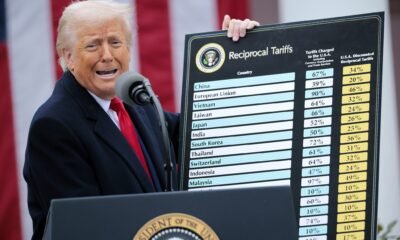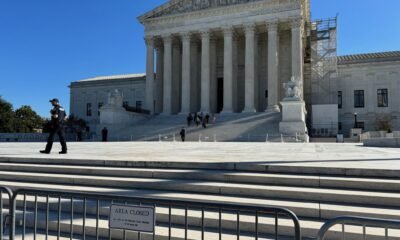border
Trump’s Registration Mandate Poses Risks for Compliant Immigrants, Advocacy Groups Alert

Immigrant rights advocates are urging caution among migrants without legal status regarding a new directive from the Department of Homeland Security (DHS) that mandates registration. Their warnings came during a virtual press conference held on Tuesday.
Prominent voices from immigrant organizations across the U.S. expressed concerns about the directive, recently upheld by a federal judge, framing it as a tool for enforcement by the Trump administration. They argue that compliance could put vulnerable individuals at risk of detention and deportation.
While group leaders stopped short of advising outright refusal to comply, they emphasized the importance of seeking legal counsel before taking any action. “This tool is to identify individuals for detention, deportation, and to threaten with imprisonment if they do not comply,” stated Angelica Salas, executive director of the Coalition for Humane Immigrant Rights.
Salas condemned the directive as contrary to core American values. “To our community, our message is that you’re not alone, you have rights, seek legal guidance, and you’re not obligated to provide information that can hurt you or your family,” she said.
The administration has drawn heavy criticism for its handling of immigrants, with allegations of sending people to detention centers, including those in Guantanamo Bay and El Salvador’s notorious CECOT prison. Advocates contend that the Trump administration has repeatedly violated laws by detaining immigrants across all legal statuses without due process.
Nicole Melaku, executive director of the National Partnership for New Americans, reiterated that all immigrants, regardless of their status, are entitled to a hearing in immigration court.
The directive mandates that immigrants registered with U.S. Citizenship and Immigration Services carry proof of their registration. Advocates warn this could lead to increased racial profiling of U.S. citizens. Salas noted that her organization is not aware of anyone who has registered under the new rule, demonstrating a widespread sense of confusion and distrust among affected individuals.
Salas remarked, “There’s a lot of confusion in our community as to whether to do this or not. What does it mean? What are the risks?” The uncertainty is compounded by concerns about the administration’s past behavior regarding immigration and family separations.
The legal battle surrounding the directive is poised to continue. U.S. Judge Trevor Neil McFadden, appointed by Trump in 2017, ruled against advocacy groups seeking to block the directive, dismissing claims of harm. However, George Escobar, chief of programs and services at CASA, confirmed that organizations are prepared to appeal the ruling and closely monitor the administration’s implementation of the directive.
Escobar raised concerns about potential racial profiling, cautioning that this could lead to situations where individuals are stopped and asked for their registration merely based on their appearance or language. “We will do everything possible to fight this,” he asserted.
Representatives from the Department of Homeland Security have not publicly commented on the situation as advocates continue to seek clarity and support for immigrant communities across the country.


















